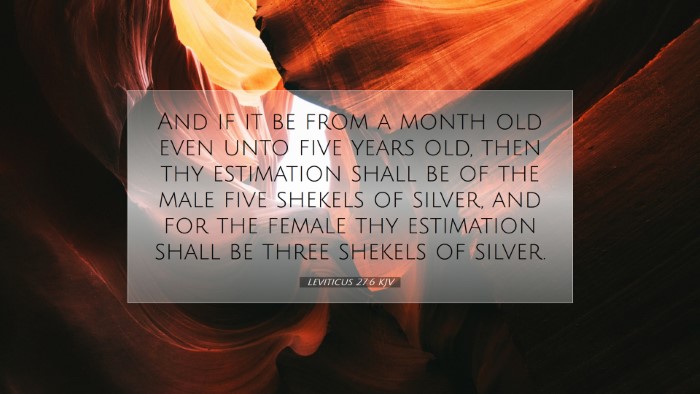Commentary on Leviticus 27:6
Leviticus 27:6: "And if it be from sixty years old and above; if it be a male, then thy estimation shall be fifteen shekels, and for the female ten shekels."
Introduction
The concluding chapters of Leviticus provide guidance on vows and dedications, particularly relating to valuations of people and possessions dedicated to the Lord. This particular verse discusses the valuation of individuals aged sixty and older, highlighting the importance of age in determining worth within the context of dedicatory offerings.
Contextual Understanding
In ancient Israel, the laws regarding valuations serve not merely as economic measures but as reflections of the sacred relationship between God and His people. The valuations expressed in verses surrounding Leviticus 27:6 reveal how worth was ascribed to individuals based on their capabilities, age, and gender.
Insights from Matthew Henry
Matthew Henry observes that the valuation of the elderly reflects the respect and honor ascribed to them in Israelite society. He notes that those who have lived long lives and contributed to the community’s spiritual and social fabric should be esteemed, illustrating God's acknowledgment of human dignity through age.
- Valuation of the Elderly: Henry argues that the values placed on males and females demonstrate a society that recognizes the wisdom and input of older generations.
- Moral Lessons: The monetary valuation is not simply a reflection of worth but carries moral implications about how we regard and treat our elders.
Insights from Albert Barnes
Albert Barnes elucidates the significance of the specified amounts for males and females. He discusses how these valuations intend to balance respect for ritual dedication with the economic realities of the community.
- Gender Sensitivity: Barnes emphasizes the importance of gender in valuations, suggesting that this reflects societal roles and contributions, though he also intertwines the spiritual equality that is a recurring theme throughout Scripture.
- Social Implications: The valuation could also serve as a reminder for the community to care for those who may be past their productive years and ensure their needs are met.
Insights from Adam Clarke
Adam Clarke provides a thorough exploration of the shekel as a unit of currency in the ancient world, relating it to economic practices among the Israelites. He offers a practical understanding of how these valuations would operate within an agrarian society.
- Currency Understanding: Clarke relates that fifteen shekels represented a significant, though not exorbitant, amount intended to reflect both the value of life experience and the responsibilities associated with older individuals.
- Age Reflection: He notes that this valuation reflects not just age, but also the transition into a phase of life where individuals should be cared for and respected.
Theological Implications
This verse invites theological reflection on several levels:
- Divine Recognition of Life Stages: God establishes a system acknowledging the varied contributions individuals make throughout different stages of life.
- Community Responsibility: The community is charged with the responsibility of honoring and supporting its elders, which resonates with New Testament teachings regarding care for one another.
- Value Beyond Economic Terms: While valuations are given in terms of shekels, the underlying message transcends financial worth, as individuals are valued for their inherent dignity as creations of God.
Application for Today’s Community
In light of contemporary society, this verse challenges modern communities to reflect on how they value their elders:
- Valuing Experience: Communities should create spaces that honor the wisdom and experience of older members, recognizing their contributions through mentorship, storytelling, and leadership.
- Addressing Ageism: Believers are called to confront ageist tendencies that diminish the worth of those who are advanced in years and provide means of support that foster dignity.
Concluding Thoughts
Leviticus 27:6 may appear as merely a regulation regarding valuations, but its implications delve deeper into the fabric of community life as instructed by divine law. The respect afforded to the elderly, as well as the nuanced understanding of their contributions, resonates with God’s character and reinforces the call to uphold dignity at every stage of life.


